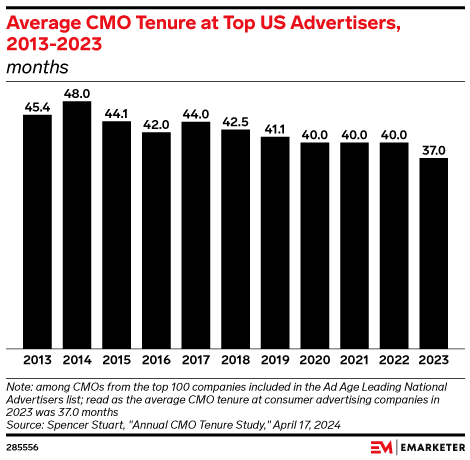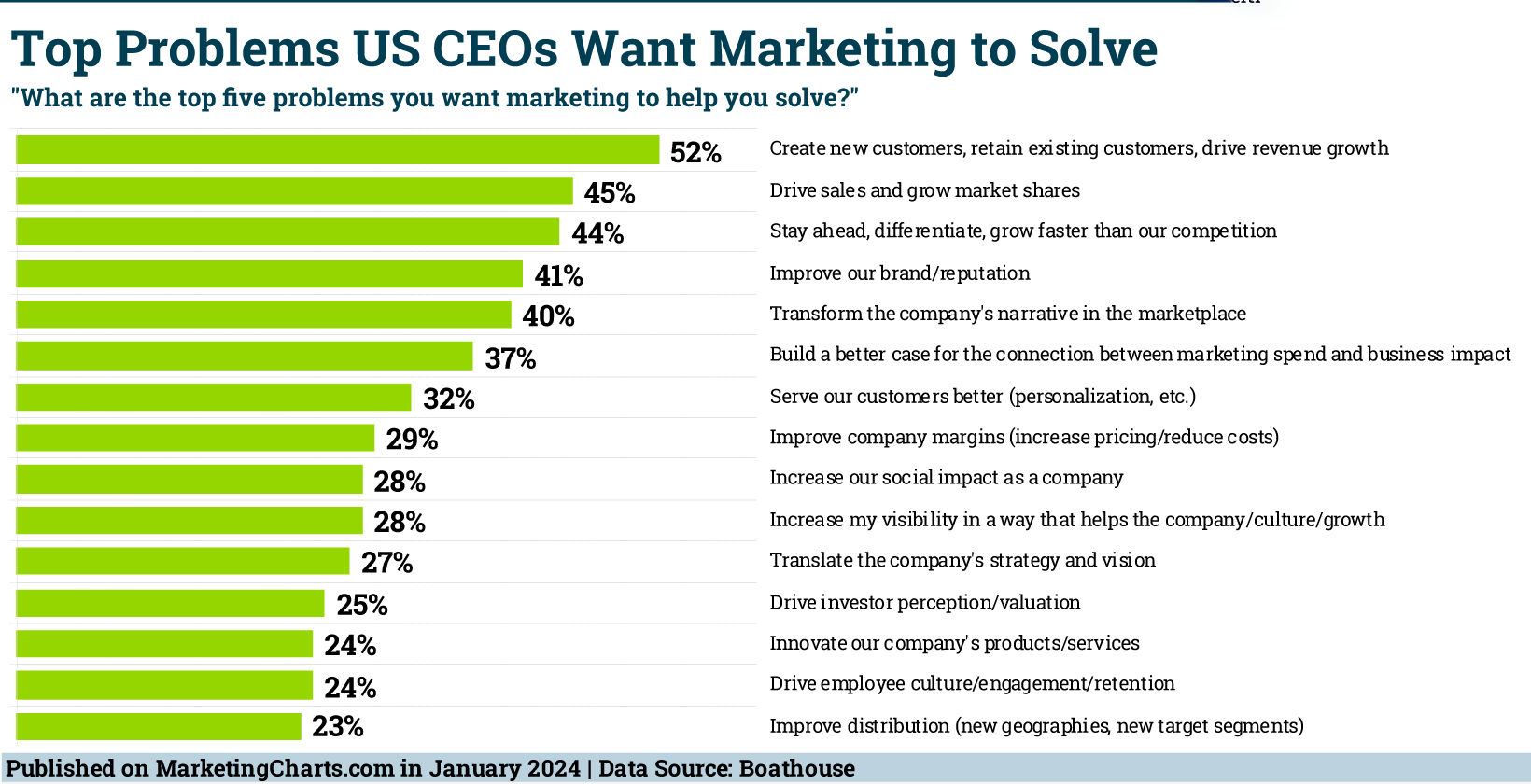
by Lori Berson | Jun 12, 2025 | Marketing, Marketing Strategy
Key Takeaways
1. Marketing Teams Without Leadership Stall
When teams are overwhelmed and lack clear direction, productivity dips. A fractional CMO offers strategic guidance that aligns and empowers your team, transforming chaos into coordination.
2. Plateaued Growth Is a Red Flag
If your marketing efforts have stopped delivering results, it’s time for a fresh perspective. A fractional CMO can identify bottlenecks and reignite your growth engine.
3. Big Business Moves Demand Sharp Strategy
Expanding, rebranding, or merging? These transitions require seasoned marketing leadership. Fractional CMOs are experts at steering companies through complex change with confidence.
4. Marketing Shouldn’t Be Everyone’s Side Hustle
When marketing falls to whoever has a spare minute, results suffer. A fractional CMO provides dedicated, expert leadership, unifying your message and maximizing ROI.
5. Executive Insight Without the Price Tag
Hiring a full-time CMO is costly. A fractional CMO delivers strategic firepower, plus the latest in AI and automation, without the bloated expense.
6. Scaling Fast? Your Marketing Should Too
Rapid growth exposes a weak marketing infrastructure. A fractional CMO builds scalable systems that grow with your business, not behind it.
7. Expertise Has Evolved
Modern marketing is as technical as it is creative. Fractional CMOs bring deep expertise in automation, analytics, and AI-driven decision-making.
8. Planning a Big Spend? Get a Big Brain
Large marketing investments require high-level oversight. A fractional CMO ensures smart allocation and optimized ROI—think compound interest for your marketing dollars.
You don’t need a full-time CMO to lead like one. Fractional CMOs blend strategic acumen with tech-savvy tools, providing leadership that matches your ambition at a fraction of the cost. The race is on. Time to shift into high gear.
You’re behind the wheel of a high-performance vehicle, but something’s off. The engine’s sputtering. You’re not hitting top speed. No matter how hard you press the gas, your competitors are zipping past in the rearview mirror. Sound familiar?
That’s exactly what happens when your marketing strategy lacks executive-level leadership. The good news? You don’t need to shell out a six-figure salary to get back in the race. Enter the fractional CMO, your secret weapon for strategic marketing leadership without breaking the bank.
1. Your Marketing Team Is Overwhelmed and Lacks Direction
When your marketers are stretched thinner than butter on toast, morale tanks, and so do results. Response times lag, deadlines slip, and strategy meetings are filled with blank stares.
Here’s the kicker: hard work isn’t the same as smart work. Without a clear strategic direction, even your most committed team members can waste energy spinning their wheels. A fractional CMO acts as the conductor of your marketing orchestra, making sure everyone plays the same tune instead of clashing solos.
2. Growth Has Hit a Wall
Remember when your marketing efforts felt like magic? Leads flowed, and ROI sparkled. Now? Crickets.
This plateau isn’t necessarily a reflection of market conditions or your product quality. Often, it signals that your current marketing strategy has maxed out. A fractional CMO brings fresh eyes and diagnostic skills to identify exactly where your growth engine has stalled, and, more importantly, restart your growth trajectory.
3. You’re Facing Major Business Transitions
Big changes, whether entering new markets, launching a bold product, or managing a merger, are make-or-break moments.
These transitions are exciting but high-risk. A fractional CMO knows how to realign messaging, re-focus teams, and turn disruption into opportunity.
4. Marketing Is Everyone’s Side Hustle
In many growing companies, marketing ends up on the CEO’s to-do list, or squeezed in by the sales director between calls. While well-intentioned, this fragmented approach rarely delivers stellar results.
With a fractional CMO, marketing becomes someone’s main job again. They bring focus, structure, and momentum to your efforts, ensuring campaigns are consistent, strategic, and on-brand.
5. You Need Expert Strategy Without the Executive Price Tag
Full-time CMOs often cost $200,000–$400,000 annually, before adding in bonuses, equity, and benefits. For many businesses, that’s a non-starter.
A fractional CMO offers the same level of insight and experience at a far more sustainable cost. You’re not settling for less, you’re investing smarter.
The Automation and AI Advantage: Today’s fractional CMOs bring cutting-edge technology that multiplies their impact exponentially. Smart automation handles repetitive tasks while AI analyzes customer data at superhuman speed. This technological leverage means you get enterprise-level sophistication without enterprise-level overhead.
6. Your Business Is Scaling Faster Than Your Marketing
Rapid growth should be a good problem, right? But when your marketing can’t keep pace with your ambitions, growth becomes a bottleneck. Processes that worked when you were smaller suddenly feel clunky, and systems break down.
A fractional CMO builds scalable marketing operations from day one, implementing systems that anticipate growth rather than react to it. When your business doubles, your marketing efficiency doesn’t just keep pace; it often improves.
7. You Lack Sophisticated Marketing Expertise
Your internal team might excel at execution, but today’s marketing requires different strategic thinking. Understanding AI-powered customer insights, building automated nurture sequences that feel personal at scale, or orchestrating omnichannel campaigns that adapt in real-time, these aren’t plug-and-play skills.
A fractional CMO brings expertise in the technologies that will define marketing’s future, preparing your team for tomorrow’s opportunities while solving today’s challenges.
8. You’re Planning Major Marketing Investments
Upping your marketing budget? Adding new tools? Growing your team?
Don’t wing it. A fractional CMO provides the guidance to allocate resources effectively and avoid costly mistakes. But more importantly, they implement systems that make every future dollar more effective than the last. Think compound interest, but for marketing ROI.
The Smart Money Play
The magic of the modern fractional CMO? They blend human strategy with digital firepower. AI finds the patterns. The CMO finds the meaning—and the opportunity.
The businesses that win aren’t just spending more. They’re spending smarter, guided by strategy, powered by technology, and scaled by experience.
The Time Is Now
Marketing isn’t getting simpler, but the opportunity is clear. The businesses leveraging fractional leadership, automation, and AI aren’t just keeping up, they’re pulling ahead.
If any of these scenarios hit close to home, you’re already ahead, you’ve identified the need. Now’s the moment to act.
Ready to shift into overdrive?
Contact Lori at BersonDeanStevens and discover how a fractional CMO can transform your marketing from a cost center into your biggest growth driver—without the executive price tag.
Don’t let another quarter pass while your competition gains ground. Your marketing strategy deserves leadership that matches your ambition, technology that amplifies your impact, and a price point that makes strategic sense.
The future of marketing is already here. Will you lead it, or let it leave you behind?
Ready to accelerate your marketing? Let’s talk about how a Fractional CMO can unlock growth smarter, faster, and more cost-effectively. Schedule a call or email Lori at lberson@BersonDeanStevens.com.
BersonDeanStevens (BDS) has been developing creative, results-driven marketing strategies, content, campaigns, and programs for over 25 years. And, we bring the knowledge and expertise to incorporate AI when necessary to gain efficiencies and help boost results. Whether you’re looking for a fractional CMO, need assistance when your internal workforce is overloaded, or need consulting from time to time, BDS is the perfect go-to resource. Client list.

by Lori Berson | May 12, 2025 | Marketing, Marketing Strategy
Growth demands more than budget, it demands a smart, scalable strategy powered by automation and AI. If your business needs executive-level marketing leadership without the long-term overhead, a Fractional CMO offers the ideal solution.
What Is a Fractional CMO?
A Fractional Chief Marketing Officer (CMO) is a seasoned executive who partners with your business part-time to drive high-impact marketing strategy, execution, and team development, without the cost or complexity of a full-time role.
Core Responsibilities:
- Align marketing with business goals.
- Lead digital and brand transformation.
- Develop go-to-market strategies.
- Leverage AI and automation for efficiency.
- Build and mentor internal teams.
- Manage performance metrics and vendors.
Why Growth-Minded Companies Are Choosing Fractional CMOs
1. Executive Strategy, Lower Overhead
A full-time CMO can cost $150,000+ per year. A Fractional CMO offers similar strategic impact for up to 80% less, typically ranging from $36,000 to $72,000 annually (approximately 10-20 hours/month) based on scope and engagement level – freeing up budget for campaigns, technology, and talent.
2. Faster Time-to-Impact
Fractional CMOs move fast. They onboard quickly, assess your business, and begin implementing a results-driven strategy in weeks, not months.
3. Fresh, Cross-Industry Insights
With experience across B2B, SaaS, e-commerce, CPG, and professional services, these leaders bring diverse strategies and apply AI-powered insights and automation to create a competitive advantage, often uncovering opportunities your internal team may overlook.
What a Fractional CMO Delivers
Strategic Planning
Effective planning blends human insight with machine-driven efficiency. Fractional CMOs:
- Analyze markets and forecast emerging trends.
- Personalize messaging at scale.
- Prioritize campaigns based on predictive lead scoring.
- Automate content workflows and scheduling.
Digital Execution & Automation
Your Fractional CMO leads digital transformation by:
- Optimizing website performance and user experience.
- Creating email campaigns that adapt based on real-time behavior.
- Automating lead-nurturing sequences.
- Enhancing CRM and marketing automation systems.
- Continuously improving campaign performance.
- Delivering actionable reporting and analytics.
Team Leadership & Skill Development
Fractional CMOs assess your team’s strengths and gaps and close those gaps with targeted hiring, coaching, and AI-enhanced workflows. They:
- Hire and mentor marketing talent.
- Upskill your in-house team.
- Train teams on using AI tools.
- Implement workflow automations to reduce repetitive tasks.
- Help teams focus on strategic thinking, not tactical busywork.
- Establish clear structure, processes, and KPIs.
Performance Management
Measurement is core. Your CMO will:
- Set up optimization using tools like GA4 and Salesforce.
- Use AI models to forecast results and guide decisions.
- Provide monthly reporting tied directly to business goals.
Vendor & Tech Stack Management
Need outside help? A Fractional CMO will:
- Source and manage marketing vendors.
- Evaluate and optimize your martech stack.
- Negotiate favorable contracts using industry benchmarks.
- Integrate platforms for CRM, content, and paid media.
How to Get Started and What to Expect
Phase 1: Discovery
Your Fractional CMO conducts a comprehensive audit of:
- Business goals, target audiences, competitors, and key challenges.
- Brand messaging and customer journey.
- Martech stack and data infrastructure.
- Current performance metrics and growth blockers.
Phase 2: Strategy Development
They deliver a comprehensive, tailored plan that includes:
- Brand Positioning – Defining your market edge and core message.
- Marketing Goals – Establishing clear, measurable targets aligned with growth.
- KPIs – Identifying metrics to track and optimize success.
- Channel Strategy – Determining where and how to engage your audience.
- Budget Allocation – Using resources strategically to maximize ROI.
Phase 3: Team Collaboration
- Clearly define roles and responsibilities.
- Share expertise, including AI and automation best practices.
- Establish a consistent communication cadence to ensure alignment.
Phase 4: Execution & Optimization
Your CMO oversees implementation, monitors performance, and continuously refines strategies using data and automation.
Real-World Impact
“A fractional CMO can provide the strategic guidance and leadership that businesses need to scale, at a fraction of the cost and commitment.”
—John Jantsch, Duct Tape Marketing
- A law firm increased qualified leads by 40% in six months.
- A SaaS company improved email engagement by 25%.
- A retail brand scaled new customer acquisition with 50% lower CAC.
Why Fractional Works
✅ Cost-Effective: Executive expertise at a fraction of the cost.
✅ Flexible: Scale engagement up or down based on business needs.
✅ Tech-Enabled: AI and automation for speed and scale.
✅ Results-Driven: Every decision is guided by measurable performance.
✅ Fast: Get to market quickly with expert-driven strategy.
✅ Innovative: Bring in fresh ideas and proven frameworks from other industries.
If your company is ready to scale its marketing without increasing overhead, a Fractional CMO delivers executive-level impact, tailored strategy, and measurable results. It’s the smart, scalable way to lead marketing.
Need to accelerate your marketing? Let’s talk about how a Fractional CMO can unlock growth smarter, faster, and more cost-effectively. Schedule a call or email Lori at lberson@BersonDeanStevens.com.
BersonDeanStevens (BDS) has been developing creative, results-driven marketing strategies, content, campaigns, and programs for over 25 years. And, we bring the knowledge and expertise to incorporate AI when necessary to gain efficiencies and help boost results. Whether you’re looking for a fractional CMO, need assistance when your internal workforce is overloaded, or need consulting from time to time, BDS is the perfect go-to resource. Client list.

by Lori Berson | Aug 12, 2024 | Marketing, Marketing Strategy
In 2023, the average CMO tenure at top US advertisers was three years and one month, significantly lower than a decade ago, according to data from Spencer Stuart. With high turnover, tight marketing budgets, and new technologies like generative AI, companies are hiring fractional CMOs—contracted marketing leaders who provide part-time, strategic, and implementation services.

Fractional CMOs integrate deeply into companies, unlike marketing agencies or interim CMOs. They typically work with smaller firms that can’t justify a full-time CMO and provide strategic leadership on a part-time basis to increase efficiency and productivity, avoiding time-draining tasks. This model is becoming increasingly popular, providing companies with access to senior marketing expertise without the commitment of a full-time executive salary.
Companies can find fractional CMOs through LinkedIn or fractional CMO networks, but they should clearly understand their needs first. Some fractional CMOs specialize in strategy, requiring additional hires for execution. Firms should look for CMOs who can both strategize and implement.
Skills specialization is crucial, especially with generative AI. Hayden Brown, CEO of Upwork, emphasizes the need for top-level AI expertise in companies. Fractional CMOs can fill this role, particularly during periods of rapid change, such as business model shifts, new product introductions, or preparations to go public.
Fractional CMO Advantages
- Expertise on Demand: Fractional CMOs bring a wealth of experience from diverse industries and backgrounds, offering fresh perspectives and innovative solutions.
- Cost Efficiency: With the ability to hire on a part-time or project basis, companies can manage budgets more effectively while still leveraging top marketing talent.
- Flexibility and Scalability: The fractional engagement allows businesses to adapt quickly to market changes and scale marketing efforts up or down based on current needs and budgets.
Potential Challenges
While the benefits are significant, there are some challenges to consider:
- Cultural Fit: A Fractional CMO might not be as embedded in the company culture, which can impact team dynamics and long-term strategy alignment.
- Divided Attention: Managing multiple clients can lead to conflicts in prioritization and focus, potentially diluting the impact on your business.
Choosing the Right Fractional CMO
Selecting the right Fractional CMO involves a strategic alignment with your company’s vision and goals. It’s crucial to define clear objectives and success metrics from the beginning and ensure regular communication and stakeholder engagement to maximize the effectiveness of the partnership.
For businesses navigating critical transformations or looking to scale efficiently without the overhead of a full-time position, a Fractional CMO is an excellent investment. By understanding both the benefits and potential pitfalls, companies can make informed decisions that align with their long-term marketing strategies and overall business objectives.
Ready to elevate your marketing strategy without the overhead of a full-time executive? Schedule a call or email Lori at lberson@BersonDeanStevens.com to discover how a Fractional CMO can drive your business forward.
BersonDeanStevens (BDS) has been developing creative results-driven marketing strategies, content, campaigns, and programs for over 25 years. And, we bring the knowledge and expertise to incorporate AI when necessary to gain efficiencies and help boost results. Whether you’re looking for a fractional CMO, need assistance when your internal workforce is overloaded, or need consulting from time to time, BDS is the perfect go-to resource. Client list.

by Lori Berson | Apr 18, 2024 | Marketing, Marketing Strategy
The role of a Chief Marketing Officer (CMO) is more critical than ever. However, not all companies can or need to onboard a full-time CMO. This is where the concept of Fractional CMOs comes into play, offering a flexible and strategic solution for businesses, particularly startups and those undergoing significant transitions.
The Rise of Fractional CMOs
A Fractional CMO is an experienced marketing professional who provides strategic leadership on a part-time basis. This model is becoming increasingly popular, providing companies with access to senior marketing expertise without the commitment of a full-time executive salary. This approach is especially beneficial for organizations at pivotal growth stages or those needing targeted project management to navigate complex marketing landscapes successfully.
Strategic Advantages of Hiring a Fractional CMO
- Expertise on Demand: Fractional CMOs bring a wealth of experience from diverse industries and backgrounds, offering fresh perspectives and innovative solutions.
- Cost Efficiency: With the ability to hire on a part-time or project basis, companies can manage budgets more effectively while still leveraging top marketing talent.
- Flexibility and Scalability: The fractional engagement allows businesses to adapt quickly to market changes and scale marketing efforts up or down based on current needs and budgets.
Potential Challenges
While the benefits are significant, there are some challenges to consider:
- Cultural Fit: A Fractional CMO might not be as embedded in the company culture, which can impact team dynamics and long-term strategy alignment.
- Divided Attention: Managing multiple clients can lead to conflicts in prioritization and focus, potentially diluting the impact on your business.
Choosing the Right Fractional CMO
Selecting the right Fractional CMO involves a strategic alignment with your company’s vision and goals. It’s crucial to define clear objectives and success metrics from the beginning and ensure regular communication and stakeholder engagement to maximize the effectiveness of the partnership.
For businesses navigating critical transformations or looking to scale efficiently without the overhead of a full-time position, a Fractional CMO is an excellent investment. By understanding both the benefits and potential pitfalls, companies can make informed decisions that align with their long-term marketing strategies and overall business objectives.
Ready to elevate your marketing strategy without the overhead of a full-time executive? Schedule a call or email Lori at lberson@BersonDeanStevens.com to discover how a Fractional CMO can drive your business forward.
For help with your marketing strategy, schedule a call or email Lori Berson at lberson@BersonDeanStevens.com.
BersonDeanStevens has been a recognized brand strategy and marketing leader for over 25 years. We work in partnership with you to differentiate your brand and achieve your business goals. Client list.

by Lori Berson | Feb 28, 2024 | Marketing, Marketing Strategy
In today’s rapidly shifting business landscape, the relationship between Chief Executive Officers (CEOs) and their marketing counterparts has entered a phase of renewed confidence and heightened expectations. According to the latest insights from the third annual CEO Study on Marketing and the CMO by Boathouse, there’s a notable uplift in how CEOs perceive the performance of their marketing leaders and teams.

Rising Confidence in Marketing Leadership
A striking aspect of the study is the growing confidence CEOs have in their CMOs. An impressive 26% of surveyed CEOs from top US companies awarded their CMOs an “A” grade for overall performance, a substantial increase from 16% the previous year. Furthermore, 40% of CEOs now consider their CMO to be “best in class,” marking a significant rise from previous years. This upward trend in confidence extends to the marketing function as a whole, with nearly half (49%) of the CEOs rating their marketing capabilities as “best in class,” a notable leap from just 24% the year before.
The Bottom Line: Growth and Revenue
But what has contributed to this surge in confidence? At its core, the answer revolves around the bottom line—growth and revenue. CEOs are increasingly looking to their marketing teams to solve critical challenges centered around these areas. The primary task? To create and retain customers to drive revenue growth. This mandate remains a cornerstone of marketing’s role, reflecting its pivotal contribution to a company’s financial success.
CEOs have laid out clear priorities for their marketing teams, emphasizing the need to drive sales, grow market shares, and outpace the competition. These goals highlight the strategic importance of marketing in not only attracting customers but also in defining a company’s standing in the market.
Branding and Narrative: More Than Just Revenue
However, it’s not all about revenue and market share. CEOs also prioritize brand-related objectives, such as improving brand reputation (41%) and transforming the company’s narrative in the marketplace (40%). This aligns with the broader understanding that a strong brand and reputation are intertwined and crucial for long-term success.
Beyond the Traditional: Social Impact and Innovation
Despite their focus on growth and branding, CEOs are also aware of the broader role marketing can play. Areas such as social impact, investor perception, and product innovation, though not ranked as top priorities, are still on the CEO’s radar. This acknowledgment points to a nuanced understanding that, while growth and revenue are paramount, long-term success also depends on innovation, social responsibility, and effective communication with investors.
This evolving CEO perspective signals a shift towards recognizing the multifaceted role of marketing in driving not just traditional outcomes like sales and brand awareness but also in shaping the company’s strategic direction and growth. As marketing teams continue to rise to these challenges, their alignment with the CEO’s vision will be critical in navigating the complexities of today’s business landscape and achieving sustained success.
About the Data: The results are based on an October 2023 survey of 150 CEOs from top US companies with at least $250 million in annual revenues. The question about the top problems that CEOs want marketing to solve was answered by half of the sample.
For help with your marketing, schedule a call or email Lori Berson at lberson@BersonDeanStevens.com.
BersonDeanStevens has been a recognized brand strategy and marketing leader for over 25 years. We work in partnership with you to differentiate your brand and achieve your business goals. Client list.






